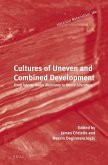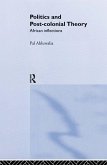How can we handle the unevenness between the West and the Rest? How inevitable is the binary logic of winners and losers? How can theory help us resolve our ethical and political problems? Can theory help us think beyond the "winner talks all" model by articulating strong connections between ethics and politics? This major intervention into debates about the postcolonial and the global proposes that theory should embody unevenness. Radhakrishnan's thought-provoking engagement with theorists and writers from around the world will fascinate readers across a wide range of disciplines.
Hinweis: Dieser Artikel kann nur an eine deutsche Lieferadresse ausgeliefert werden.
Hinweis: Dieser Artikel kann nur an eine deutsche Lieferadresse ausgeliefert werden.
"R. Radhakrishnan belongs to a generation of critics which hasenriched contemporary literature by revolutionizing the literarycanon. He is one of the foremost of this generation and deservedlyso." Amitav Ghosh, author of The Glass Palace
"Written with a magnanimous spirit and vision, Theory in anUneven World is a welcome reminder of the challengestheoretical thinking continues to pose. I applaud R. Radhakrishnanfor countering the fashionable gesture of theory-bashing with suchintensely engaging critical discussions." Rey Chow, BrownUniversity
"In a world ridden with unevenness, Radhakrishnan'sintense analyses invoke the need for shattering the self-reflexivediscourses of the academy so as to open them up to the demands ofthe oppressed." Robert J.C. Young, New York University
"Written with a magnanimous spirit and vision, Theory in anUneven World is a welcome reminder of the challengestheoretical thinking continues to pose. I applaud R. Radhakrishnanfor countering the fashionable gesture of theory-bashing with suchintensely engaging critical discussions." Rey Chow, BrownUniversity
"In a world ridden with unevenness, Radhakrishnan'sintense analyses invoke the need for shattering the self-reflexivediscourses of the academy so as to open them up to the demands ofthe oppressed." Robert J.C. Young, New York University








